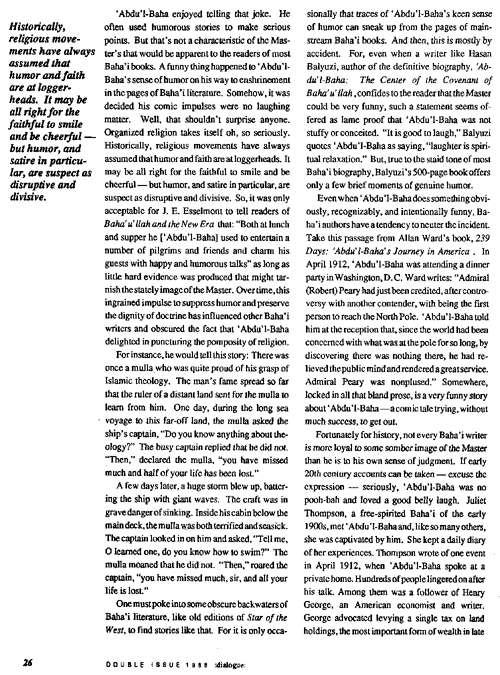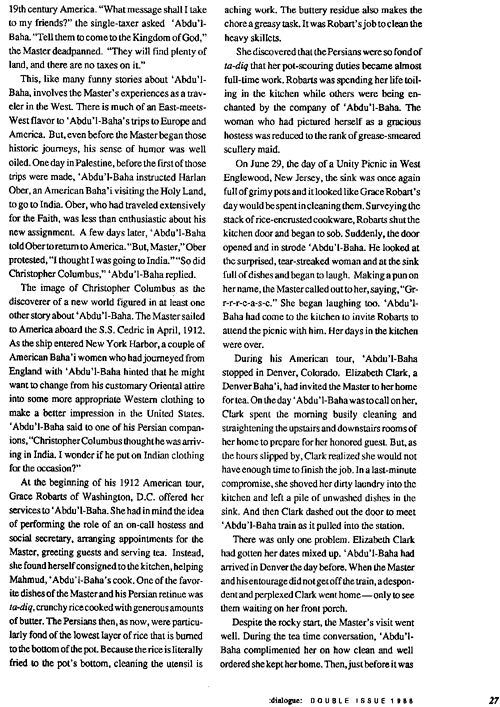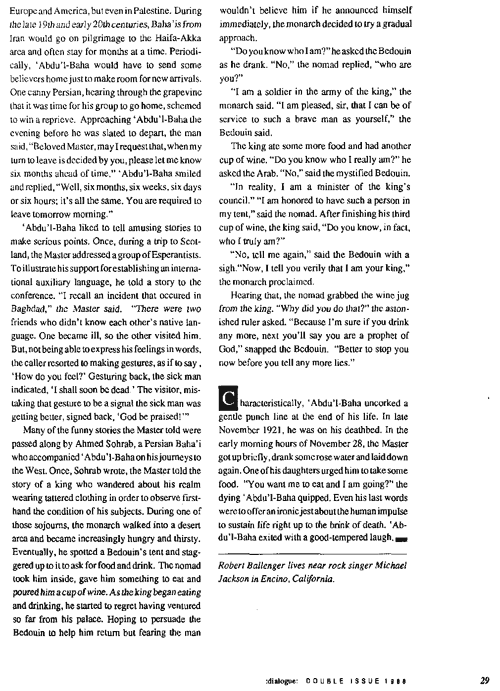
|
|
Abstract: Examples of the humor of Abdu'l-Bahá, jokes he told, and how this aspect of the Master's personality has been downplayed in biographies and portrayals of him which cast him in a more serious light. Notes: See also a Compilation on Humor and Laughter. See also list of dialogue articles or image scans. |
'Abdu'l-Bahá enjoyed telling that joke. He often used humorous stories to make serious points. But that’s not a characteristic of the Master’s that would be apparent to the readers of most Bahá’í books. A funny thing happened to 'Abdu'l-Bahá’s sense of humor on his way to enshrinement in the pages of Bahá'í literature. Somehow, it was decided his comic impulses were no laughing matter. Well, that shouldn’t surprise anyone. Organized religion takes itself oh, so seriously. Historically, religious movements have always assumed that humor and faith are at loggerheads. It may be all right for the faithful to smile and be cheerful — but humor, and satire in particular, are suspect as disruptive and divisive. So, it was only acceptable for J. E. Esslemont to tell readers of Bahá'u'lláh and the New Era that:”Both at lunch and supper he ['Abdu'l-Bahá] used to entertain a number of pilgrims and friends and charm his guests with happy and humorous talks” as long as little hard evidence was produced that might tarnish the stately image of the Master. Over time, this ingrained impulse to suppress humor and preserve the dignity of doctrine has influenced other Bahá'í writers and obscured the fact that 'Abdu'l-Bahá delighted in puncturing the pomposity of religion.
For instance, he would tell this story: There was a mulla who was quite proud of his grasp of Islamic theology. The man’s fame spread so far that the ruler of a distant land sent for the mulla to learn from him. One day, during the long sea voyage to this far-off land, the mulla asked the ship’s captain, “Do you know anything about theology?” The busy captain replied that he did not. “Then,” declared the mulla, “you have missed much and half of your life has been lost.”
A few days later, a huge storm blew up, battering the ship with giant waves. The craft was in grave danger of sinking. Inside his cabin below the main deck, the mulla was both terrified and seasick. The captain looked in on him and asked, “Tell me, O learned one, do you know how to swim?” The mulla moaned that he did not. “Then,” roared the captain, “you have missed much, sir, and all your life is lost.”
One must poke into some obscure back waters of Bahá'í literature, like old editions of Star of the West, to find stories like that. For it is only occasionally that traces of 'Abdu'l-Bahá’s keen sense of humor can sneak up from the pages of mainstream Bahá'í books. And then, this is mostly by accident. For, even when a writer like Hasan Balyuzi, author of the definitive biography, 'Abdu'l-Bahá: The Center of the Covenant of Bahá'u'lláh, confides to the reader that the Master could be very funny, such a statement seems offered as lame proof that 'Abdu'l-Bahá was not stuffy or conceited. “It is good to laugh,” Balyuzi quotes 'Abdu'l-Bahá as saying, “laughter is spiritual relaxation.” But, true to the staid tone of most Bahá'í biography, Balyuzi’s 500-page book offers only a few brief moments of genuine humor.
Even when 'Abdu'l-Bahá does something obviously, recognizably, and intentionally funny, Bahá'í authors have a tendency to neuter the incident. Take this passage from Allan Ward’s book, 239 Days: 'Abdu'l-Bahá’s Journey in America. In April 1912, 'Abdu'l-Bahá was attending a dinner party in Washington, D.C. Ward writes: “Admiral (Robert) Peary had just been credited, after controversy with another contender, with being the first person to reach the North Pole. 'Abdu'l-Bahá told him at the reception that, since the world had been concerned with what was at the pole for so long, by discovering there was nothing there, he had relieved the public mind and rendered a great service. Admiral Peary was nonplused.” Somewhere, locked in all that bland prose, is a very funny story about 'Abdu'l-Bahá — a comic tale trying, without much success, to get out.
Fortunately for history, not every Bahá'í writer is more loyal to some somber image of the Master than he is to his own sense of judgment. If early 20th century accounts can be taken — excuse the expression — seriously, 'Abdu'l-Bahá was no pooh-bah and loved a good belly laugh. Juliet Thompson, a free-spirited Bahá'í of the early 1900s, met 'Abdu'l-Bahá and, like so many others, she was captivated by him. She kept a daily diary of her experiences. Thompson wrote of one event in April 1912, when 'Abdu'l-Bahá spoke at a private home. Hundreds of people lingered on after his talk. Among them was a follower of Henry George, an American economist and writer. George advocated levying a single tax on land holdings, the most important form of wealth in late 19th century America. “What message shall I take to my friends?” the single-taxer asked 'Abdu'l-Bahá. “Tell them to come to the Kingdom of God,” the Master deadpanned. “They will find plenty of land, and there are no taxes on it.”
This, like many funny stories about 'Abdu'l-Bahá, involves the Master’s experiences as a traveler in the West. There is much of an East-meets-West flavor to 'Abdu'l-Bahá’s trips to Europe and America. But, even before the Master began those historic journeys, his sense of humor was well oiled. One day in Palestine, before the first of those trips were made, 'Abdu'l-Bahá instructed Harlan Ober, an American Bahá'í visiting the Holy Land, to go to India. Ober, who had traveled extensively for the Faith, was less than enthusiastic about this new assignment. A few days later, 'Abdu'l-Bahá told Ober to return to America. “But, Master,” Ober protested, “I though I was going to India.” “So did Christopher Columbus,” 'Abdu'l-Bahá replied.
The image of Christopher Columbus as the discoverer of a new world figured in at least one other story about 'Abdu'l-Bahá. The Master sailed to America aboard the S.S. Cedric in April, 1912. As the ship entered New York harbor, a couple of American Bahá'í women who had journeyed from England with 'Abdu'l-Bahá hinted that he might want to change from his customary Oriental attire into some more appropriate Western clothing to make a better impression in the United States. 'Abdu'l-Bahá said to one of his Persian companions, “Christopher Columbus thought he was arriving in India. I wonder if he put on Indian clothing for the occasion?”
At the beginning of his 1912 American tour, Grace Robarts of Washington, D.C. offered her services to 'Abdu'l-Bahá. She had in mind the idea of performing the role of an on-call hostess and social secretary, arranging appointments for the Master, greeting guests and serving tea. Instead, she found herself consigned to the kitchen, helping Mahmud, 'Abdu'l-Bahá’s cook. One of the favorite dishes of the Master and his Persian retinue was <>ta-diq, crunchy rice cooked with generous amounts of butter. The Persians then, as now, were particularly fond of the lowest layer of rice that is burned to the bottom of the pot. Because the rice is literally fried to the pot’s bottom, cleaning the utensil is aching work. The buttery residue also makes the chore a greasy task. It was Robarts’ job to clean the heavy skillets.
She discovered that the Persians were so fond of <>ta-diq that her pot-scouring duties became almost full-time work. Robarts was spending her life toiling in the kitchen while others were being enchanted by the company of 'Abdu'l-Bahá. The woman who had pictured herself as a gracious hostess was reduced to the rank of grease-smeared scullery maid.
On June 29, the day of a Unity Picnic in West Englewood, New Jersey, the sink was once again full of grimy pots and it looked like Grace Robarts’ day would be spent in cleaning them. Surveying the stack of rice-encrusted cookware, Robarts shut the kitchen door and began to sob. Suddenly, the door opened and in strode 'Abdu'l-Bahá. He looked at the surprised, tear-streaked woman and at the sink full of dishes and began to laugh. Making a pun on her name, the Master called out to her, saying, “Gr-r-r-r-e-a-s-e.” She began laughing too. 'Abdu'l-Bahá had come to the kitchen to invite Robarts to attend the picnic with him. Her days in the kitchen were over.
During his American tour, 'Abdu'l-Bahá stopped in Denver, Colorado. Elizabeth Clark, a Denver Bahá'í, had invited the Master to her home for tea. On the day 'Abdu'l-Bahá was to call on her, Clark spent the morning busily cleaning and straightening the upstairs and downstairs rooms of her home to prepare for her honored guest. But, as the hours slipped by, Clark realized she would not have enough time to finish the job. In a last-minute compromise, she shoved her dirty laundry into the kitchen and left a pile of unwashed dishes in the sink. And then Clark dashed out the door to meet 'Abdu'l-Bahá’s train as it pulled into the station.
There was only one problem. Elizabeth Clark had gotten her dates mixed up. 'Abdu'l-Bahá had arrived in Denver the day before. When the Master and his entourage did not get off the train, a despondent and perplexed Clark went home — only to see them waiting on her front porch.
Despite the rocky start, the Master’s visit went well. During the tea time conversation, 'Abdu'l-Bahá complimented her on how clean and well ordered she kept her home. Then, just before it was time to leave, the Master asked for a glass of water.
“I’ll get it,” Clark said, jumping up to head for her cluttered kitchen. “It would be an honor for me to serve you.”
“No, no, no,” 'Abdu'l-Bahá interrupted though his interpreter. “My name is 'Abdu'l-Bahá and that means I am a servant. I’ll get the water.”
And, with that, he walked into her kitchen. A mortified Elizabeth Clark could only wait for what would happen next. After a few moments, 'Abdu'l-Bahá emerged from her messy kitchen with a glass of water, drank a few sips and handed her the glass. And then, speaking in English, he joked, “And you thought you could hide something from 'Abdu'l-Bahá?”
Stories like these are valuable because they evoke the basic charm of 'Abdu'l-Bahá. The figure the Master cuts on the pages of Bahá'í books is a formidable one. He is variously described as a “tall, strongly built man” with “eyes as keen as a hawk’s,” a person of “eloquent speech” and “a bearing at once majestic and genial.” Bahá'í writers are generous with accolades like “highly respected,” “sincere, courageous,” “alert and active.” These laudatory word portraits paint the picture of a man who is nothing less than a modern-day saint. As the “Perfect Example” for the rest of us to emulate, the Master is a tough act to follow. But his sense of humor functions as saving grace. The fact that 'Abdu'l-Bahá enjoyed poking fun at the world around him tells us that he didn’t regard life as overwhelmingly serious.
'Abdu'l-Bahá had a knack for indulging and, at the same time, deflating the self-important images of those around him. In London, in late 1912, the Master was invited to Christmas Eve dinner at the home of Lady Blomfield. He said he was not hungry but attended the dinner party at Lady Blomfield’s insistence. “Two despotic monarchs in the East have not been able to command me, but the ladies of Europe and America, because they are free, give me orders,” 'Abdu'l-Bahá quipped.
Earlier that same year, 'Abdu'l-Bahá had been asked to be the guest of honor at a formal luncheon party given by Mrs. Arthur Parsons in Dublin, New Hampshire. In the early 1900s, Dublin was an elite summer colony for wealthy families living on the East Coast. Parsons was eager that the Master make a good impression on this socially conscious crowd. The guests were seated at a perfectly appointed table, complete with a maid at each person’s elbow. During the meal, to Parsons’ horror, 'Abdu'l-Bahá ate with his fingers. Later in the luncheon, instead of impressing the guests with spiritual insights — as Parsons had hoped he would — the Master began regaling them with stories of his life, talking about the time he spent as a prisoner of the Turkish government and relating amusing incidents from those days. Soon all the guests were laughing with delight at his stories. The worried Mrs. Parsons relaxed and enjoyed the success of her luncheon. When the meal was done and the guests were leaving, the Master approached her and asked, “Were you pleased with me?”
'Abdu'l-Bahá was a popular figure, not just in Europe and America, but even in Palestine. During the late 19th and early 20th centuries, Bahá'ís from Iran would go on pilgrimage to the Haifa-Akká area and often stay for months at a time. Periodically, 'Abdu'l-Bahá would have to send some believers home just to make room for new arrivals. One canny Persian, hearing through the grapevine that it was time for his group to go home, schemed to win a reprieve. Approaching 'Abdu'l-Bahá the evening before he was slated to depart, the man said, “Beloved Master, may I request that, when my turn to leave is decided by you, please let me know six months ahead of time.” 'Abdu'l-Bahá smiled and replied, “Well, six months, six weeks, six days or six hours; it’s all the same. You are required to leave tomorrow morning.”
'Abdu'l-Bahá liked to tell amusing stories to make serious points. Once, during a trip to Scotland, the Master addressed a group of Esperantists. To illustrate his support for establishing an international auxiliary language, he told a story to the conference. “I recall an incident that occurred in Baghdad,” the Master said. “There were two friends who didn’t know each other’s native language. One became ill, so the other visited him. But, not being able to express his feelings in words, the caller resorted to making gestures, as if to say, ‘How do you feel?’ Gesturing back, the sick man indicated, “I shall soon be dead.’ The visitor, mistaking that gesture to be a signal the sick man was getting better, signed back, ‘God be praised!”
Many of the funny stories the Master told were passed along by Ahmed Sohrab, a Persian Bahá'í who accompanied 'Abdu'l-Bahá on his journeys to the West. Once, Sohrab wrote, the Master told the story of a king who wandered about his realm wearing tattered clothing in order to observe first-hand the condition of his subjects. During one of those sojourns, the monarch walked into a desert area and became increasingly hungry and thirsty. Eventually, he spotted a Bedouin’s tent and staggered up to it to ask for food and drink. The nomad took him inside, gave him something to eat and poured him a cup of wine. As the king began eating and drinking, he started to regret having ventured so far from his palace. Hoping to persuade the Bedouin to help him return but fearing the man wouldn’t believe him if he announced himself immediately, the monarch decided to try a gradual approach.
“Do you know who I am?” he asked the Bedouin as he drank. “No,” the nomad replied, “who are you?”
“I am a soldier in the army of the king,” the monarch said. “I am pleased, sir, that I can be of service to such a brave man as yourself,” the Bedouin said.
The king ate some more food and had another cup of wine. “Do you know who I really am?” he asked the Arab. “No,” said the mystified Bedouin.
“In reality, I am a minister of the king’s council.” “I am honored to have such a person in my tent,” said the nomad. After finishing his third cup of wine, the king said, “Do you know, in fact, who I truly am?”
“No, tell me again,” said the Bedouin with a sigh. “Now, I tell you verily that I am your king,” the monarch proclaimed.
Hearing that, the nomad grabbed the wine jug from the king. “Why did you do that?” the astonished ruler asked. “Because I’m sure if you drink any more, next you’ll say you are a prophet of God,” snapped the Bedouin. “Better to stop you now before you tell any more lies.”
Characteristically, 'Abdu'l-Bahá uncorked a gentle punch line at the end of his life. In late November 1921, he was on his deathbed. In the early morning hours of November 28, the Master got up briefly, drank some rose water and laid down again. One of his daughters urged him to take some food. “You want me to eat and I am going?” the dying 'Abdu'l-Bahá quipped. Even his last words were to offer an ironic jest about the human impulse to sustain life right up to the brink of death. 'Abdu'l-Bahá exited with a good-tempered laugh.
Robert Ballenger lives near rock singer Michael Jackson in Encino, California.
 click for larger image |
 click for larger image |
 click for larger image |
 click for larger image |
 click for larger image |
|
|